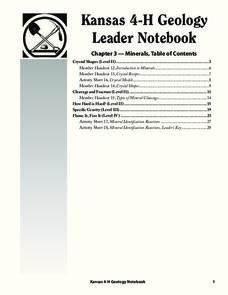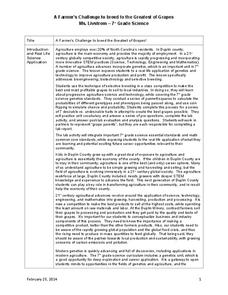Teach Engineering
Dirty Decomposers
Do not let the class just sit and rot. Pupils learn how decomposition and nutrient recycling is important to an ecosystem. Groups design an experiment to determine how environmental conditions affect decomposition. They develop a poster...
Intel
Insects: The Good, The Bad, The Ugly
What would the world be like with no insects? Ponder this question using a research-based STEM unit that encourages scholars to investigate insects from both a beneficial and hazardous perspective. They learn about insect behaviors,...
K-State Research and Extensions
Crystal Shapes
Of quartz I love geology! The chapter offers five activities at three different levels. It features hands-on activities that cover crystal shapes, cleavage and fracture, hardness scale, specific gravity, and mineral identification....
Howard Hughes Medical Institute
Using DNA to Explore Lizard Phylogeny
In a fun and interactive two-day lesson, learners sort anole lizard pictures by appearance. Next, they watch a video about the anoles and re-sort based on the information in the video. In addition to physical characteristics, budding...
Howard Hughes Medical Institute
The Making of the Fittest: Natural Selection in Humans
Sickle cell disease only occurs when both parents contribute the trait, and mostly in those of African descent. Where did it come from? How did it evolve? Tony Allison, a molecular biologist, noticed a connection between sickle cell and...
Scholastic
Study Jams! Plant Adaptations
Mia video chats with Sam from Hawaii! They talk about plant adaptations that allow them to live in particular environments. Examples include the flexible stems and leaves, or floating seeds and flowers of aquatic plants. The adaptive...
Keeping a Betta
Swim with the fishes. Class members observe, research, and record physical characteristics of Betta fish. They change the environment of the aquarium by adding rocks and plants and observe any reactions the fish have to the new environment.
Museum of Science
Worm Farm
It is not a barrel of monkeys—it's a jar of worms! Scholars create a worm farm in a spaghetti sauce jar. Pupils layer moist soil, sand, and oatmeal to create a habitat for worms. Individuals place worms into the habitat, cover it with...
American Museum of Natural History
Find My Plankton Baby Picture
Get a better understanding of babies in the sea. The class learns about the two kinds of plankton. They then determine the baby pictures of eight marine animals given a picture of the adult and some hints about the larvae. When scholars...
American Museum of Natural History
What's the Big Idea About Genetics?
Here's a quick read on genetics. An engaging online resource provides six slides of information about genetics. Learners read about the meaning of genetics to information about DNA. They also learn about the study of genes and the...
American Museum of Natural History
What Do You Know About Genetics?
Just what do you know about genetics? The online resource contains 10 questions about genetics. Scholars work through the questions ranging from what DNA stands for to how much of human DNA is similar to that of a fruit fly. Scholars...
American Museum of Natural History
A Nature and Nurture Walk in Mendel Park
We are what we make of ourselves ... sometimes. Learners play a game to come up with the answer to a riddle. The game consists of determining whether different scenarios are due to nature or nature and nurture. With each correct answer,...
Aquarium of the Pacific
Kelp Forest Conservation
There otter be a better way. As a class, groups work together to create a food web based on the organisms in the kelp forest. Budding scientists watch a video on the kelp forest to see how the organisms create a food web and hear about...
National Wildlife Federation
Pollinator's Journey: Grades 5-8
Re-enact the flight of the pollinator. Pupils learn about the roles of butterflies, bats, and other pollinators in plant reproduction. The class acts out the migratory flight of Monarch butterflies and bats from the Sonoran Desert to...
CK-12 Foundation
CK-12 Earth Science Concepts for Middle School
Explore a variety of science concepts in an interactive textbook created for middle school scholars. A lengthy table of contents takes readers to pages comprised of a subject overview, outline, and summary. Follow links further to find...
Purdue University
Food Waste and the Environment
Out of sight out of mind can be a dangerous habit. Learners investigate the life of food waste after it leaves people's homes and its impact on the environment. They complete a series of three activities that involve building a mini...
NOAA
Are You Climate Literate?: Play the Essential Principles Challenge
Installment eight of the 10-part Discover Your Changing World series tests the class's understanding of climate. Scholars play alone or in small groups to assess their understanding of climate systems, causes of climate change, and...
NOAA
Why Should I Care?: Show How Increased Carbon Dioxide Makes the Ocean More Acidic
How does a change in pH affect the ocean ecosystem? Scholars explore the idea by making an acid-base indicator in part seven of the 10-installment Discover Your Changing World series. First, they explore impacts of carbon dioxide in...
Cornell Lab of Ornithology
Jump, Glide, or Fly? Exploring Bird Evolution
How have birds evolved from prehistoric animals? With the three-part instructional activity, small groups first research different prehistoric animals and determine whether they are birds. Then, scholars explore different bird...
Howard Hughes Medical Institute
Testing a Hypothesis
Are sickle cell disease and malaria related somehow? Scholars learn about both illnesses and the hypotheses that they are related. They discuss, view a video, and answer questions to demonstrate understanding. The resource includes an...
National Park Service
The Young Naturalist
Beginning with a brief history of our 26th president, Theodore Roosevelt, then followed by a discussion of his interest in nature, young scientists take to the outdoors to locate and observe local plants and insects. Scholars return to...
Howard Hughes Medical Institute
Using DNA to Explore Lizard Phylogeny
On the Caribbean islands, lizards expanded into different niches instead of competing for resources. Scholars discuss and learn from experts in a video how scientists prove the theory. They build phylogenetic trees based on appearances...
Howard Hughes Medical Institute
Using Genetic Crosses to Analyze a Stickleback Trait
Two fish appear different, but how do scientists determine their genotypes? Scholars practice performing test crosses to determine the genotypes of fish given their phenotypes. They answer in-depth comprehension questions and complete...
Kenan Fellows
A Farmer’s Challenge to Breed to the Greatest of Grapes
What does your class know about GMOs? Are they savvy to selective breeding? Challenge young minds to engineer the greatest crop of all time using a hands-on genetics unit. Learners discover the good and bad details of selective breeding,...






















